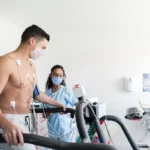What is a Stress Test? How and why is it Performed?
Cardiology

What is a Stress Test? How and why is it Performed?
Cardiovascular diseases vary, and various tests are performed to diagnose these diseases. One of these test types is the stress test. In the stress test, the patient is placed on a motorized treadmill and blood pressure and ECG recordings are monitored during the test. For this reason, a cardiologist and technician accompany the patient during the test. The walking speed and incline of the patient on the treadmill are adjusted by the doctor, thus aiming to increase the heart rate. During the test, the patient’s complaints such as chest pain, shortness of breath, fatigue, dizziness, etc. are questioned. It is of great importance to examine the patient and monitor resting ECGs before the stress test. Disorders that cannot be detected in resting electrocardiography can be detected with exercise testing. The test may not be interpreted correctly in patients with ECG changes. In such cases, other appropriate tests are applied to patients.
How is a stress test performed?
In the resting test that begins with electrodes being attached to the patient’s chest, the patient’s pulse and blood pressure are recorded with ECG while at rest. In the continuation of the resting stress test, the patient’s ECG is taken while lying down, standing, and during deep breathing exercises for one minute. At the beginning of the standard test, the treadmill moves slowly and with little incline, then speed and incline are increased every three minutes. At the beginning of the test, brisk walking will be sufficient. In advanced stages, you may need to run. The reason for the applied tempo increases is to systematically increase the load on the heart and ensure that the pulse is calculated according to your age. For this reason, the exercises performed may vary according to the patient’s age and exercise capacity. The average duration of the stress test can be between 8 and 10 minutes. In the stress test, the patient’s pulse is continuously monitored and blood pressure is measured at each stage.
Why is a stress test performed?
- Investigation of cardiovascular disease
- Determining the severity of the disease
- Determining the risk level in patients who have had a heart attack
- Measuring the effectiveness of treatment
- Determining the possibility that chest pains are caused by heart disease
- Investigation of cardiovascular disease in people over 40 years of age who carry multiple cardiovascular disease risks despite having no complaints
- Investigation of exercise-induced heart rhythm disorders
- Determination of exercise capacity
- Investigation of exercise capacity in patients with various heart diseases
- Effects of exercise on blood pressure in hypertension patients
- Follow-up of patients who have undergone heart surgery (bypass, heart valve surgery, etc.) and coronary interventions (balloon, stent)
is a test used for this purpose. The stress test measures the heart’s response when load is placed on the heart. For this reason, the stress test is used in the diagnosis of heart diseases. Treatment can be started without delay for heart disease diagnosed with the test.
Who should not have a stress test?
- Those with congestive heart failure
- Those with advanced aortic valve stenosis
- Those with severe hypertrophic cardiomyopathy
- Those with malignant hypertension
- Those with advanced heart rhythm disorders
- Those with heart muscle or membrane inflammatory disease
cannot have a stress test. Performing a stress test in the diseases mentioned above can lead to serious complications.
Things to consider before the stress test
- Nothing should be eaten until approximately 3 hours before
- Smoking should be avoided
- The doctor should be informed about continuously used medications
- If you have previously taken ECGs, they should be shown to the doctor
- Women should not wear one-piece clothing
- Men should shave chest hair
- If you have any complaints during the test, they should be reported to the doctor
- Patients using heart rhythm-affecting medications such as Dideral, Visken, Lopresol, Prent, Nortan, Tensinor, Beloc, Concor, Dilatrend, Digoxin, etc. should consult their doctor about reducing or stopping medication use before the test
- Hypertension patients should consult their doctor about taking blood pressure-lowering medications
Infectious Diseases 3















